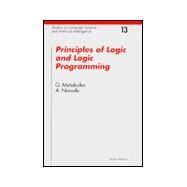
| Propositional Logic | |
| Introduction | |
| The language of propositional logic | |
| Semantic concepts in propositional logic | |
| Truth tables | |
| Consequences and interpretations | |
| Adequacy of logical connectives - normal forms | |
| Semantic tableaux | |
| Axiomatic proofs | |
| Resolution | |
| Soundness and completeness of tableaux | |
| Deductions from assumptions | |
| Soundness and completeness of axiomatic proofs | |
| Soundness and completeness of resolution | |
| Exercises | |
| Predicate logic | |
| Introduction | |
| The language of predicate logic | |
| Axiomatic foundation of predicate logic | |
| Notation in logic programming | |
| Interpretations of predicate logic | |
| Normal forms in predicate logic | |
| Herbrand interpretations | |
| Proofs with systematic tableaux | |
| Unification and resolution in PrL | |
| Soundness and completeness of PrL proofs | |
| Decision methods in logic | |
| Exercises | |
| Logic Programming: The Prolog Paradigm | |
| PROLOG and Logic Programming | |
| Logic and programming | |
| Logic programming | |
| Historical evolution | |
| Program Structure | |
| The program elements | |
| The facts | |
| The rules | |
| The queries | |
| Syntax of Data | |
| The objects of PROLOG | |
| The alphabet of PROLOG | |
| The variables | |
| The constants | |
| The predicates | |
| Tree structure of predicates | |
| The lists | |
| Operation Mechanism | |
| The unification procedure in PROLOG | |
| Inference and the backtracking procedure | |
| Depth-first search | |
| Controlling backtracking: cut | |
| Recursive definitions in PROLOG | |
| List management | |
| Built-in Predicates | |
| Data management predicates: assert and retract | |
| Interaction predicates: read, write and consult | |
| Equality in PROLOG | |
| Arithmetic in PROLOG | |
| Type checking of objects | |
| The operators | |
| The Towers of Hanoi | |
| Negation in PROLOG | |
| The closed world assumption and negation by failure | |
| Normal goals | |
| Completion of programs | |
| Normal programs and stratification | |
| The predicate fail | |
| The predicate not | |
| Nonmonotonic logics | |
| Expert Systems | |
| Artificial intelligence | |
| Expert systems and knowledge management | |
| An expert system for kidney diseases | |
| The Evolution of Logic Programming | |
| Editions of PROLOG | |
| Dialects of PROLOG | |
| PROLOG and metaprogramming | |
| PROLOG and parallelism | |
| PROLOG and Predicate Logic | |
| Exercises | |
| Bibliography | |
| Index of Symbols | |
| Index of Terms | |
| Table of Contents provided by Publisher. All Rights Reserved. |
The New copy of this book will include any supplemental materials advertised. Please check the title of the book to determine if it should include any access cards, study guides, lab manuals, CDs, etc.
The Used, Rental and eBook copies of this book are not guaranteed to include any supplemental materials. Typically, only the book itself is included. This is true even if the title states it includes any access cards, study guides, lab manuals, CDs, etc.